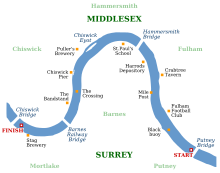The Boat Race 1963
| 109th Boat Race | |||
|---|---|---|---|
| Date | 23 March 1963 | ||
| Winner | Oxford | ||
| Margin of victory | 5 lengths | ||
| Winning time | 20 minutes 47 seconds | ||
| Overall record (Cambridge–Oxford) | 60–48 | ||
| Umpire | G. A. Ellison (Oxford) | ||
| |||
The 109th Boat Race took place on 23 March 1963. Held annually, the event is a side-by-side rowing race between crews from the Universities of Oxford and Cambridge along the River Thames. The race, umpired by Gerald Ellison, the Bishop of Chester, was won by Oxford with a winning margin of five lengths.
Background
The Boat Race is a side-by-side rowing competition between the University of Oxford (sometimes referred to as the "Dark Blues")[1] and the University of Cambridge (sometimes referred to as the "Light Blues").[1] The race was first held in 1829, and since 1845 has taken place on the 4.2-mile (6.8 km) Championship Course on the River Thames in southwest London.[2][3] The rivalry is a major point of honour between the two universities, followed throughout the United Kingdom and broadcast worldwide.[4][5] Cambridge went into the race as reigning champions, having won the previous year's race by five lengths, and led overall in the event with 60 victories to Oxford's 47 (excluding the "dead heat" of 1877).[6][7]
Cambridge's coaches were Harry Almond (who rowed for Cambridge in the
The race was umpired by Gerald Ellison, Bishop of Chester, who had rowed for Oxford in the 1932 and 1933 races.[10]
Crews
The Oxford crew weighed an average of 13
A correspondent for The Times noted that although there "has never been the slightest possibility" that the Cambridge crew would be of "really first rate", the hard work had produced a "presentable University crew".[9] Meanwhile, although Oxford had "no stars" and had arrived at Putney as an "unusually backward crew", progress during practice made for definite improvement.[9]
| Seat | Oxford |
Cambridge | ||||
|---|---|---|---|---|---|---|
| Name | College | Weight | Name | College | Weight | |
Bow |
S. R. Morris | St Edmund | 11 st 11 lb | P. J. Webb | Queens' | 11 st 0 lb |
| 2 | N. V. Bevan | Balliol | 12 st 11 lb | M. V. Bevan | Downing | 12 st 9.5 lb |
| 3 | R. A. Morton-Maskell | Keble | 13 st 9 lb | A. V. Cooke | Jesus | 12 st 13.5 lb |
| 4 | M. Q. Morland | Lincoln | 13 st 7 lb | B. J. R. Jackson | Clare | 12 st 7.5 lb |
| 5 | R. C. T. Mead | Keble | 13 st 7 lb | J. Maasland | Queens' | 14 st 1.5 lb |
| 6 | D. D. S. Skailes | Keble | 13 st 6 lb | M. H. Beckett | Queens' | 13 st 0.5 lb |
| 7 | P. A. V. Roff | New College | 12 st 9 lb | D. F. Legget | Trinity Hall | 12 st 6 lb |
Stroke |
D. C. Spencer | Christ Church | 12 st 11 lb | Lord Chewton (P) | 1st & 3rd Trinity | 10 st 12 lb |
| Cox | C. M. Strong | Keble | 8 st 13 lb | F. G. G. de Rancourt | 1st & 3rd Trinity | 9 st 0 lb |
| Source:[14] (P) – Boat club president (Toby Tennant was Oxford's non-rowing president)[15] | ||||||
Race

Oxford won the
Level by Harrods Furniture Depository, Oxford were half a length up by Hammersmith Bridge, increasing to over a length by The Doves pub, despite an "almost despairing spurt" from Cambridge.[16] The lead was three and a half lengths by Chiswick Steps and four and a half by Barnes Bridge.[17] Oxford won by five lengths in a time of 20 minutes 47 seconds, the slowest time since the 1951 race. It was the Dark Blues' first victory in three years and took the overall record to 60–48 in Cambridge's favour.[7]
References
Notes
- ^ a b "Dark Blues aim to punch above their weight". The Observer. 6 April 2003. Retrieved 24 August 2014.
- ^ Smith, Oliver (25 March 2014). "University Boat Race 2014: spectators' guide". The Daily Telegraph. Retrieved 24 August 2014.
- ^ "The Course". The Boat Race Company Limited. Retrieved 20 August 2014.
- ^ "Former Winnipegger in winning Oxford–Cambridge Boat Race crew". CBC News. 6 April 2014. Retrieved 24 August 2014.
- ^ "TV and radio". The Boat Race Company Limited. Retrieved 24 August 2014.
- ^ "Classic moments – the 1877 dead heat". The Boat Race Company Limited. Archived from the original on 28 October 2014. Retrieved 12 October 2014.
- ^ a b "Boat Race – Results". The Boat Race Company Limited. Retrieved 10 October 2014.
- ^ Burnell, pp. 110–111
- ^ a b c d "Cambridge "coming to the boil"". The Times. No. 55657. 23 March 1963.
- ^ Burnell, pp. 49, 74
- ^ Dodd, p. 340
- ^ Burnell, p. 39
- ^ Topolski, Daniel; Robinson, Patrick. True Blue: The Oxford Boat Race Mutiny.
- ^ a b c Burnell, p. 80
- ^ Burnell, pp. 51–52, 102
- ^ a b "Cambridge rowed down from behind". The Times. No. 55658. 25 March 1963.
- ^ a b "Oxford win handsomely and comfortably". The Guardian. 25 March 1963. p. 13.
Bibliography
- ISBN 0950063878.
- Dodd, Christopher (1983). The Oxford & Cambridge Boat Race. Stanley Paul. ISBN 0091513405.


